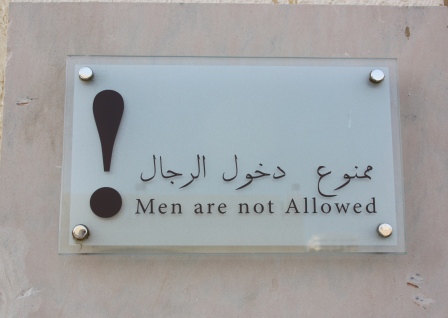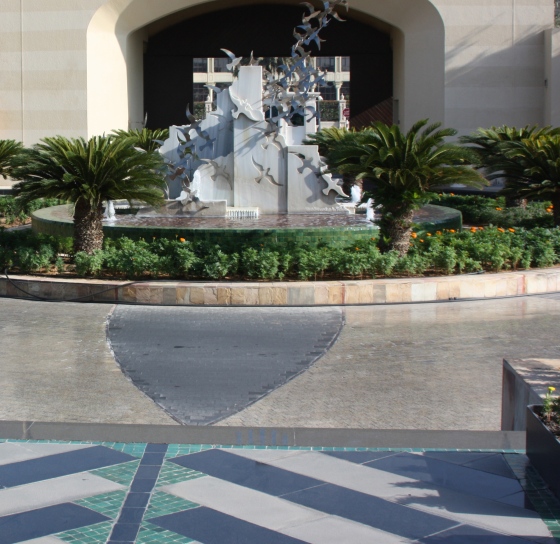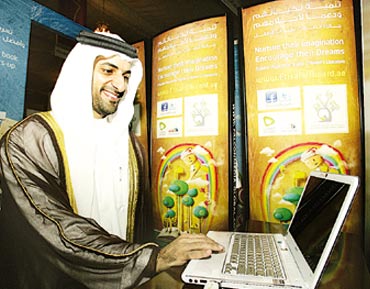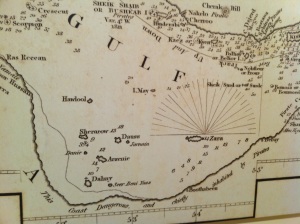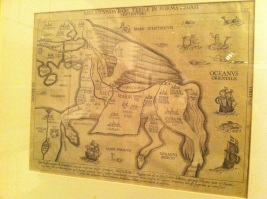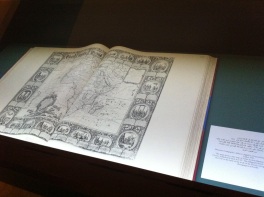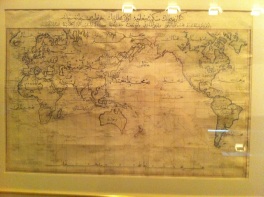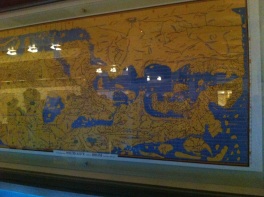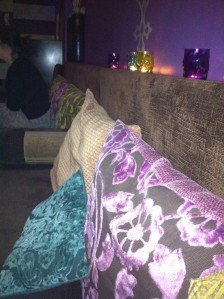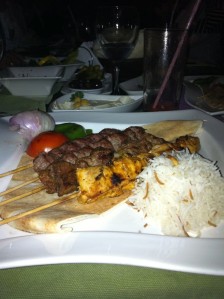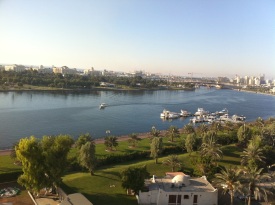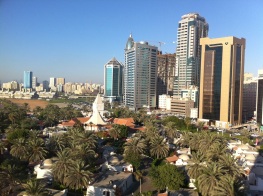Amazing experience at the Sharjah Ladies Club, we dipped are feet in the gulf, toured the luxurious spa and grounds, talked to a princess (really), drank a mock mojito, and well, if I told you anymore I would have to kill you. ![]()
Sharjah International Book Fair 29th Edition

- #shjibf Sharjah International Book Fair #shjibf
- Sharjah, United Arab Emirates
- ExpoCenter 7th - 17th November, 2012. Hours | Saturday - Thursday: 10a.m. - 10p.m.; Friday: 4p.m - 10p.m.
Saturday, 19 November 2011
Day 3- Sharjah Ladies Club « 10 Days in Sharjah
gulftoday.ae | ‘Egypt needs committed intellectuals to unite nation’
 SHARJAH: The Supreme Council Member and Ruler of Sharjah His Highness Sheikh Dr Sultan Bin Mohammed Al Qasimi has called on Egyptian intellectuals to help unite the country as it goes through this period of power change.
SHARJAH: The Supreme Council Member and Ruler of Sharjah His Highness Sheikh Dr Sultan Bin Mohammed Al Qasimi has called on Egyptian intellectuals to help unite the country as it goes through this period of power change.
He was attending a cultural lecture presented by an Egyptian intellectual, former Member of Parliament and representative of the country on the international nuclear body (IAEA), Dr Mustafa Al Faqi.
“I have been asked by Dr Mustafa of what I think of Egypt. Even if the earth crumbles, Allah has inspired Egypt (the revolution), and they will agree. I wanted to [help] bring them together, but this would mainly be the work of intellectuals,” Sheikh Sultan said.
The one-hour lecture was held on Thursday night on the sidelines of the ongoing Sharjah International Book Fair (SIBF). Sheikh Sultan is commonly seen attending lectures on a daily basis.
Dr Mustafa raised a number of concerns on the direction of cultural development in the Arab world. He said the change of government in Egypt is breeding a culture of intolerance that we didn’t have as Arabs and Muslims. “The spirit of tolerance that Islam was known for is waning fast thanks to some Salafi people. It is a source of concern because we might be isolated. Islam has never taught exerting pressure on others.”
Dr Mustafa took a jibe at a “growing elements in the West that portray us in five Bs: Billionaires; Bedouins; Bellydancers; as people that love Bargaining on everything, and now we are Bombers.”
He said that these negatives have to be transformed “and this Sharjah experience of cultural development is poised to change such stereotypes.”
“Culture plays a big role in modern relationships. It destroys barriers and helps bring together global human beings. “I am sure the Westerners do not understand us and we do not understand them as it should be. If the cultural gap is closed through things like marriage and globalization, then doors of a better future are opened.”
Responding to some of the points raised by Dr Mustafa, Sheikh Sultan said, “When I was seated in a restaurant in Germany with a number of Westerners, I told them how we are also victims of historical tragedies, but you’re punishing us as Arabs. Is that justice? I told them there is dust between us and you, but let us put in the refrigerator to freeze. All of them came and shook my hand.”
At the seminar, Dr Mustafa also cautioned the audience about being taken away by the Internet culture. “While it is crucial that we should be competent in the area of information technology, we should not succumb to the cultural poverty bred by the Internet.”
He drew an example of how the death of Princess Diana overshadowed that of the Indian Albanian born charity icon, Mother Teresa in 1997. They died in the same week.
Sheikh Sultan also attended a seminar titled ‘The Challenges of Culture in The Arab World’ in the Conference Hall of Sharjah Expo Centre.
The seminar, organised by the Department of Culture and Information, saw the participation of Dr Shaker Abdulhamid, Egypt, Mohammed Saber Arab, Egypt, and Dr. Zeinuddine Mohammed Abdulhadi.
Exquisite Corpse Surrealist Poetry in the UAE « 10 Days in Sharjah
"The Truth" in Sharjah International Book Fair | MENANN
Within Sharjah International Book Fair 2011 activities and in its thirtieth session, in a creative & renewable environment bringing to visitors everything that is new and useful, the exhibition management established a seminar entitled "How do we make our memories deceive us - the search for truth," with the participation of the writers Peter James, Sonatra Gupta, Souad Youseph Said and Mohamed Ahmed Jarallah. The Seminar which witnessed a great & special attendance was held in forum Hall 1 in Expo Centre Sharjah.
The Seminar was Introduced and moderated by Mr. Mohammed Al Hosni, who praised the attention of the exhibition to the communication with many cultures and foreign Sciences, in order to select and provide the best each year. As for the Seminars’ attendees, a group of prominent writers of Criminal novels Arabs and foreigners attended, such as Peter James who is considered one of the most important authors of crime and suspense stories in the United Kingdom, & who has sold a more than two million copies of his series of novels, "Roy Grace” in the United Kingdom alone, and six million copies in the world.
Author Peter James talked about the style of writing his criminal novels where he seeks through them the disclosure of other aspects of human nature that may be evil or odd, but it does exist. He also discussed the presence of individuals in society that we may deal with every day and believe that they are nice and normal, but in fact they are "criminals," and also spoke about lot of crimes that occur and are committed by these people, which might be strange or shocking but it does exist in our societies, and this is what he saw through his experience in the police escort through their work in the detection of crimes.
The writer Sonatra Gupta has expressed great admiration and fond in the crime novels and her love for her specialty in writing around it. Through her novels she always try to address many details about the crime derived from the pure reality, she lists the facts and truth to give the reader a mental image and wider scope of imagination, she also base in her novels to answer the question: "Why the criminal committed the crime?"
Writer Souad Youseph Said also shared her experience in detective writing, that was initiated with the competition launched by the General Command of Dubai Police in 2008 for the best detective or criminal story, and her novel "a crime after the middle of the night," won the first prize in the competition. The novel was inspired from a real crime that took place in Dubai, and enriched with some suspense elements added by her. She noted that her involvement in police work and working on various crimes helped her to expand her imagination and create a fictional &interesting events, and her involvement in the awareness work helped her to deliver her ideas to the reader, as well as reading the international police stories, played a vital role in the refinement of her criminal story writing.
On the other hand, writer Mohamed Jarallah talked about his novel "The Glove" which was entirely inspired by his imagination, for her worked on hiring its components to clarify the nature of criminal evidence in which the police, specialist & detectives use to discover the offender, such as fingerprints & footprints. "Jarallah" also stressed , “there are many people & it may be the majority, who do not know how to deal with forensic evidence, who also does not know if they run into a particular situation they should maintain such evidence, and said: "In such a situation, many unintentionally damage the Criminal evidence since they have no clue how it actually looks.” So, through his novel "The Glove" "Jarallah" tried to clarify the nature of criminal evidence and how to maintain them.
The Seminar was Introduced and moderated by Mr. Mohammed Al Hosni, who praised the attention of the exhibition to the communication with many cultures and foreign Sciences, in order to select and provide the best each year. As for the Seminars’ attendees, a group of prominent writers of Criminal novels Arabs and foreigners attended, such as Peter James who is considered one of the most important authors of crime and suspense stories in the United Kingdom, & who has sold a more than two million copies of his series of novels, "Roy Grace” in the United Kingdom alone, and six million copies in the world.
Author Peter James talked about the style of writing his criminal novels where he seeks through them the disclosure of other aspects of human nature that may be evil or odd, but it does exist. He also discussed the presence of individuals in society that we may deal with every day and believe that they are nice and normal, but in fact they are "criminals," and also spoke about lot of crimes that occur and are committed by these people, which might be strange or shocking but it does exist in our societies, and this is what he saw through his experience in the police escort through their work in the detection of crimes.
The writer Sonatra Gupta has expressed great admiration and fond in the crime novels and her love for her specialty in writing around it. Through her novels she always try to address many details about the crime derived from the pure reality, she lists the facts and truth to give the reader a mental image and wider scope of imagination, she also base in her novels to answer the question: "Why the criminal committed the crime?"
Writer Souad Youseph Said also shared her experience in detective writing, that was initiated with the competition launched by the General Command of Dubai Police in 2008 for the best detective or criminal story, and her novel "a crime after the middle of the night," won the first prize in the competition. The novel was inspired from a real crime that took place in Dubai, and enriched with some suspense elements added by her. She noted that her involvement in police work and working on various crimes helped her to expand her imagination and create a fictional &interesting events, and her involvement in the awareness work helped her to deliver her ideas to the reader, as well as reading the international police stories, played a vital role in the refinement of her criminal story writing.
On the other hand, writer Mohamed Jarallah talked about his novel "The Glove" which was entirely inspired by his imagination, for her worked on hiring its components to clarify the nature of criminal evidence in which the police, specialist & detectives use to discover the offender, such as fingerprints & footprints. "Jarallah" also stressed , “there are many people & it may be the majority, who do not know how to deal with forensic evidence, who also does not know if they run into a particular situation they should maintain such evidence, and said: "In such a situation, many unintentionally damage the Criminal evidence since they have no clue how it actually looks.” So, through his novel "The Glove" "Jarallah" tried to clarify the nature of criminal evidence and how to maintain them.
- At the end of the seminar discussion panels were opened among participants and attendees, and some asked critical questions that opened the door to valuable & interesting debates. The most important question addressed to author Peter James was about the perfect crime and that if it really exists, and he answered that “we have not heard about the perfect crime yet not because it doesn’t exist, but we did not know it in the first place.”
- It is note-worthy that the activities of the Sharjah International Book Fair will run until November 26, 2011.
مدونة نادي الكتاب العربي: توقيع إحدى عشر كتاباً جديداً مساء السبت الموافق 19 نوفمبر في معرض الشارقة الدولي للكتاب
19 نوفمبر, 2011
توقيع إحدى عشر كتاباً جديداً مساء السبت الموافق 19 نوفمبر في معرض الشارقة الدولي للكتاب
Did you Know~ TIMES OF WAR, CHANCE FOR PEACE | The River
BY JAMIE DEDES
“Every gun that is made, every warship launched, every rocket fired, signifies in the final sense a theft from those who hunger and are not fed, those who are cold and not clothed … “ Dwight D. Eisenhower, 34th President of the United States of American (1953-1961)
That quote is from Eisenhower’s speech, A Chance for Peace, delivered in 1953 three months after he took office and on the occasion of the death of Joseph Stalin, Premier of the Soviet Union (1941 to 1953). The “just peace” that the world hoped for in 1945 at the end of World War II had not materialized. While the Korean War was coming to a close, the Cold War-era military conflicts in Indochina (Vietnam, Laos, and Cambodia) were slowly escalating. The United States would have advisory troops in Vietnam in 1954. The armed conflict in that region of the world would continue long past Eisenhower’s administration with U.S. involvement escalating in the 1960s and continuing until the Fall of Saigon in 1975.
Since the end of the Second World War and the Korean War, violent conflict continues unabated with thirteen wars (defined as 1,000 or more deaths per year) currently, including the War in Afghanistan and the Yemeni and Syrian uprisings of 2011. Smaller scale conflicts resulting in fewer than 1,000 deaths per year have been rife and in 2011 include the Sudan-SPLM-N conflict, the Yemeni al-Qaeda crackdown, and the 2011 clashes in Southern Sudan. Genocides didn’t end either. We’ve had eight genocides since the Holocaust of WWII. The number of rebel groups is now over 100, which probably errs on the light side. Conflicts rise from economic and social instability, which could be addressed if we invested in butter, not guns. Even in 1953, Eisenhower pointed out that war isn’t sustainable:
“This world in arms is not spending money alone.
It is spending the sweat of its laborers, the genius of its scientists, the hopes of its children.
The cost of one modern heavy bomber is this: a modern brick school in more than 30 cities.
It is two electric power plants, each serving a town of 60,000 population. It is two fine, fully equipped hospitals.
It is some fifty miles of concrete pavement.
We pay for a single fighter plane with a half million bushels of wheat.
We pay for a single destroyer with new homes that could have housed more than 8,000 people.”
If governments don’t recognize that Earth and her people cannot be sustained by war, many of their citizens do. One modern peaceful protest for a sustainable world is of interest to all of us who read, write, and love both poetry and peace. It is 100 Thousand Poets for Change, which held its first world-wide rally on September 24, 2011 with 700 events in 550 cities representing 95 participating countries united to promote peaceful environmental, social, and political change. Poets, writers, artists, musicians, and photographers the world over demonstrated in solidarity. The next global event is scheduled for September 29, 2012. Throughout the year small, local events are delivered at a various venues. By invitation, 100 Thousand Poets for Change is at the Sharjah (an Arab Emirate) International Book Fair, running through November 27. MujeebJaihoon reports, “From time immemorial, poetry has built better bridges between people than those with bricks and stones. And these bridges do not get old or obsolete…” [Change Is Born in the Womb of Poetry]
In A Chance for Peace Eisenhower pointed out, “No people on earth can be held, as a people, to be an enemy, for all humanity shares the common hunger for peace and fellowship and justice.” We do hunger, individually and collectively. Perhaps our chance for peace starts with you and me. Poem on …
The Amazing Shobhaa De « Que Sera Sara?
The last two days have been amazing – and full of outstanding women.
دار الخليــــج-ثقافة-سلطان بن أحمد القاسمي يدشن الموقع الإلكتروني لجائزة اتصالات لكتاب الطفل
دشن الشيخ سلطان بن أحمد القاسمي رئيس مؤسسة الشارقة للإعلام الموقع الإلكتروني الجديد لجائزة اتصالات لكتاب الطفل بحضور الشيخة بدور بنت سلطان القاسمي رئيسة المجلس الإماراتي لكتب اليافعين، وتم التدشين في جناح المجلس على هامش مشاركته الواسعة في المعرض . يأتي إطلاق الموقع الجديد للجائزة انسجاماً مع استراتيجيات المجلس الإماراتي لكتب اليافعين التي تعزز أهمية ايصال ودعم كتاب الطفل على المستويات الخليجية والإقليمية والعالمية، وقد استمع الشيخ سلطان بن أحمد القاسمي إلى شرح مفصل حول الموقع الجديد تقدمت به مروة العقروبي المنسق العام للجائزة، وتضمن شرح مزايا الموقع، وأقسامه والتسهيلات الجديدة التي يحتويها في تدعيم أسلوب عمل إدارة الجائزة على الوجه الذي ينسجم والمكانة المتقدمة التي وصلت اليها خلال الفترة القليلة الماضية . وقال الشيخ سلطان بن أحمد القاسمي: “تؤكد الشارقة في أكثر من مناسبة على أنها منارة فكرية وثقافية مهمة، وقد استطاعت أن تستقطب اليها المثقفين والكتّاب والقراء من جميع أنحاء العالم، وتؤسس لمكانة كبيرة تنسجم ودورها الحضاري الداعم للقيم التراثية والعربية الاصيلة، ويسعدني في هذه المناسبة ان أشيد بدور المؤسسات الثقافية الإماراتية الكبرى في تدعيم هذا الطموح المهم، ونثمن مايقوم به المجلس الإماراتي لكتب اليافعين ممثلاً بشخص الشيخة بدور القاسمي ودورها الكبير في الارتقاء بأدب وثقافة الطفل، متمنين لها المزيد من التوفيق والنجاح” . وقالت الشيخة بدور بنت سلطان القاسمي: “توج المجلس الإماراتي لكتب اليافعين مشاركته الفاعلة في دورة معرض الشارقة الدولي للكتاب بتدشين موقعه الجديد الذي شرفنا بافتتاحة الشيخ سلطان القاسمي، حيث سيسهم الموقع في دفع عجلة ثقافة الطفل الى أقصى مدى من خلال اتاحة امكان التسجيل الفوري للمتقدمين الى المشاركة بالجائزة، وتسليط الضوء بشكل مقرب على فعالياتها، ونتوقع ان يسهم الموقع في زيادة المشاركات، وارتفاع معدل المنافسة بما يكفل ظهور قصص ترتقي للمنافسة في المحافل الثقافية الدولية” . ويضم الموقع العديد من المحتويات المهمة منها معلومات عن شروط ومواعيد الترشيح وقوائم أفضل عشرة كتب للدورات السابقة والكتب الفائزة ونبذة عن المجلس الإماراتي لكتب اليافعين واستمارات التسجيل وغيرها الكثير من المحتويات التي ستفيد جميع الشرائح من ناشرين وكتّاب ورسامين وحتى الآباء والأطفال . |
Ahdaf Soueif Reads from Forthcoming Book, ‘Cairo: My City, Our Revolution’ | Arabic Literature (in English)
Attendees at the “The Woman’s Voice in Fiction: Global Perspectives” talk Thursday at the 2011 Sharjah International Book Fair had the tremendous privilege of hearing a few paragraphs from Ahdaf Soueif’s forthcoming memoir, Cairo: My City, Our Revolution.
The book is scheduled forrelease by Bloomsbury in January 2012. Soueif is still finalizing the translation into Arabic, she said Thursday. I didn’t catch the Arabic publisher, but I imagine it will be Dar el Shorouk.
The book, which interweaves Soueif’s long relationship with Cairo with the events of January and February of this year, was written quickly, she said. But it is nonetheless in her thoughtful, musical style. Soueif said at the event that the women writers she has most admired are George Eliot and Colette; these influences are evident in her writing.
Unfortunately, I had some trouble with background noise and my recorder, so I am not able to share a small snippet in her voice.
The sections she read began with struggle:
“Families will spend months of heartbreak finding out, and trying to prove, how their children were killed. … And in the midst of it all, soldiers will break down and cry and be comforted by the revolutionaries.”
But the Egyptian people in this account are never passive. They fight back “with their bare hands, improvised weapons, and the anger of many years.”
 Soueif moves this material in and around her family story, here contrasting her mother and her aunt Tufi:
Soueif moves this material in and around her family story, here contrasting her mother and her aunt Tufi:
“When my mother was twelve, she fell twelve with rheumatic fever. This meant she got to stay in bed and read.” On the other hand, Tufi was the one who kept her curtains properly pleated, to hide the seams: “Tufi’s flat was a demonstration of the proper way of doing things.”
Soueif also discussed the reasons she has not been able to finish her novel-in-progress, including personal losses (the deaths of her mother and husband), projects (PalFest). These were already enough to slow the writing of her novel, which she began in 2001. And then, she said:
And then I started again on the novel I was writing, and then the revolution came. So insha’allah once I put this text into Arabic I will turn to the novel I was writing when the revolution happened and work out if I can complete it. And let’s hope nothing else major happens until I get it done.
Soueif had spoken with Sarah Carr about that novel project in 2008. Carr wrote that the novel is set 4,000 years ago, in the period of transition after Upper and Lower Egypt went to war. Soueif told Carr:
“Four thousand years ago, Egypt was in its Middle Kingdom, which is like its classical period, when they carried out agricultural and irrigation projects and there was a literary renaissance.
“But what happened is that the Old Kingdom collapsed very suddenly, resulting in a war between the north and Upper Egypt, which Upper Egypt won, and which resulted in the Middle Kingdom.
“It seems to me that there was a period — the age of chaos — during the war and that there was a group of people who decided that this wouldn’t be the end of history.
“When the country was reunited they sat down and decided the values on which the country would be based.
“Whereas before people had faith in physical structures such as the Pyramids, they became disillusioned with these structures during the age of chaos precisely because it hadn’t saved them from this chaos.
“In addition, whereas previously only the king was considered to have a soul, in the Middle Kingdom everyone was thought to have a soul — which you can consider a bit like the beginning of democracy.”
Carr wrote:
Soueif sees clear parallels between Egypt’s transition through the age of chaos 4,000 years ago and the turmoil and moral questioning the world is currently going through, which she thinks can only be stopped through “radical change.”
I do hope that somehow Soueif can turn down invitations to appear at festivals and talks (although I have always so enjoyed seeing her), the myriad interviews and other duties, so that she can focus on the novel. And I do hope that it brings her some small peace.
Soueif has written pieces for The Guardian about Egypt; I believe some of these have been incorporated into the memoir. Read them at The Guardian.
You can read the publicity material about Cairo: My City on Bloomsbury’s website.
Sharjah 2011: Library, University and the Sultan’s Collections | AnnaNotKarenina
Following on from Wednesday morning’s opening ceremony at the Book Fair, we were whisked off on a tour of some of the cultural buildings commissioned by the Sultan, with which he has strong connections.
Sharjah Library
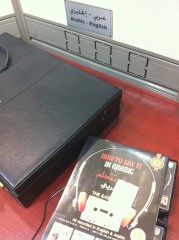 We got a quick look at Sharjah’s newest public library, just six months old – you can see pics on Lisa Dempster’s blog for theEmerging Writers’ Festival. It was a massive, palatial building in a traditional style of architecture, and still felt very new.
We got a quick look at Sharjah’s newest public library, just six months old – you can see pics on Lisa Dempster’s blog for theEmerging Writers’ Festival. It was a massive, palatial building in a traditional style of architecture, and still felt very new.
It had a well-used children’s room, open until 8pm, facilities for the visually-impaired to read and use the internet and even Linguaphone stations, to learn everything from business English to Swedish.
The HH Dr Sultan al Qasimi Centre for Gulf Studies
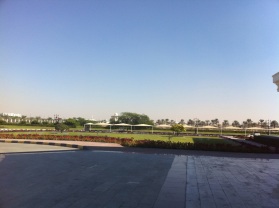 Another massive palace set in the desert in landscaped gardens, this time dedicated to the life and collections of the ruler of Sharjah.
Another massive palace set in the desert in landscaped gardens, this time dedicated to the life and collections of the ruler of Sharjah.
The Centre contained a wing showcasing the academic awards of the Sultan, displaying his graduation gowns from his doctorate ceremonies and images from throughout his life: from school high-jump competitions to his days as an actor and his time studying in Cairo.
Most interesting to me was the wing devoted to the Sultan’s private collection of rare maps of the Gulf, made by travellers and scholars. My personal favourite was one carefully inscribed around the coast of the Gulf the legend “this coast dangerous, and chiefly inhabited by pirates.”
Sharjah University
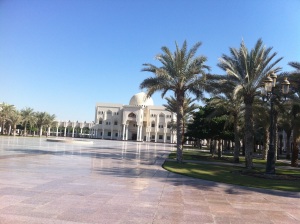 A brief trip to the University showed us the scale of investment in higher education: the many individual colleges (Engineering, Law, Arts and so on) had their own grounds within the wider University sector, and the medical school held a place of especial pride.
A brief trip to the University showed us the scale of investment in higher education: the many individual colleges (Engineering, Law, Arts and so on) had their own grounds within the wider University sector, and the medical school held a place of especial pride.
The University opened officially in 1999, set in acres of wide open space, with the grounds made up of carefully cultivated gardens.
Food and Accomodation
Dinner was in al Qasba at Shababeek restaurant, near the ferris wheel, and comprised of more food than I have ever seen in one place. Sara Grady and I foolishly believed it to be meze style, and ate our fill of what turned out to be merely the starter.
Here’s two slightly different views of Sharjah, looking in different directions from my hotel balcony:
Coming Up…
A tour around the heart of Sharjah and a trip to the souk; panel discussions on women’s literature; a trip to the Sharjah Art Museum; dinner in the desert and a camel ride.
